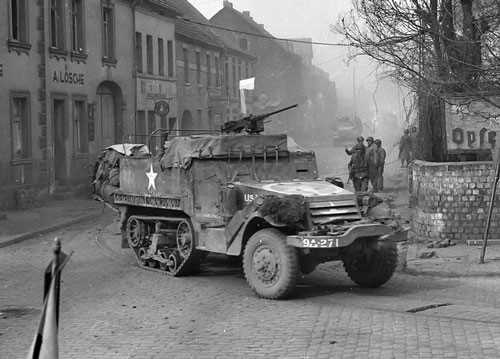
| Year | May 1941 |
| Vehicle Type | [@type] |
| Origin & Designer | [@designer] |
| Numbers Produced | 9.485 |
| Crew | 3 (Commander, Driver & Assistant Driver + 10 Troops) |
| Main Armament | 1 x .50 cal Heavy Machine Gun |
| Main Armament | [@sponson_traverse] |
| Elevation | [@elevation] |
| Turret Traverse | [@turret_traverse] |
| Gun Traverse | [@gun_traverse] |
| Gun Mount | [@gun_mounts] |
| Maximum Range | [@maximum_range] |
| Armour Penetration | [@armour_penetration] |
| Gun Sight | 6.16m |
| Secondary Armament | 3 x .30 cal M1919A4 Machine Gun |
| Smoke Discharger | [@smoke_discharger] |
| Ammunition Carried | 700 x .50 cal & 4000 x .30 cal |
| Height | 2.30m |
| Width | 2.20m |
| Length | 6.16m |
| Combat Weight | 9.100 |
| Ground Clearance | 0.28m |
| Fording Depth | 0.81m |
| Trench Crossing | 0.76m |
| Obstacle Clearance | 0.30m |
| Climbing Ability | 31° |
| Radio | [@radio] |
| Armour | Upper Hull Front: 13mm. Lower Hull Front: 6.4mm. Upper Hull Sides: 6.4mm. Lower Hull Sides: 6.4mm. Hull Rear: 6.4mm. Hull Top: Open. Hull Bottom: 6.4mm. Hood: 6.4mm. |
| Engine | White 160AX (Petrol) |
| Transmission | 4 Forward & 1 Reverse |
| Maximum Road Range | 198 miles (320 km) |
| Maximum Cross Country Range | 175 miles (282 km) |
| Maximum Water Range | [@maximum_water_range] |
| Maximum Road Speed | 45 mph (72 kph) |
| Maximum Cross Country Speed | 9 mph (15 kph) |
| Maximum Water Speed | [@maximum_water_speed] |
| Variants | M3A1: Quantity: 2.862 Year: October 1943 Ring Mount and Pulpit for .50 cal M2HB Heavy Machine Gun plus three Pintles for extra .30 cal M1919A4 Machine Guns |
| Notes | The US army expressed the need for a personnel carrier, so they developed the chassis that had been used on the M2 half-track and merged it with a new hull, resulting vehicle was built by White, Autocar and Diamond T and called the M3. It had a longer body than the M2 and could carry a full twelve men Infantry Squad. Unlike the earlier M2 it had rear door access and replaced the skate rail with a pedestal mounted heavy machine gun. The M3 saw extensive service in World War Two and also saw action in the Korean War. |